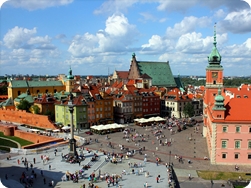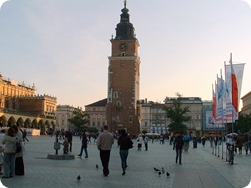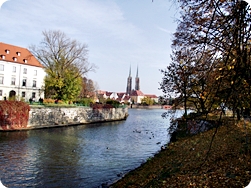
Solidarność (Solidarity)
Solidarność or Solidarity in English is the Polish trade union that challenged Communist rule in the 1980's that led to the end of Russian rule in much of eastern Europe. Known as “The Solidarity Movement”, a broad based movement whose actions constituted the first cracks in the Communist system and eventually bought it tumbling down in 1989.
The best known leader to emerge from the movement was Lech Wałęsa, an electrician by trade. Soon after beginning work at the Gdańsk (in those days known as the, “Lenin”) Shipyards, he became a dissident trade-union activist. For this he was persecuted by the Communist authorities, placed under surveillance, fired in 1976, and arrested several times before becoming Poland's first post Communist president in 1990.
Strikes
It started in the summer of 1980 following a decade of disquiet and economic problems, when the authorities decided to raise the prices of meat in the workers canteens causing a wave of strikes that spread across Poland including the Gdańsk shipyards and the coal mines in the south of the country. The Communist authorities were forced to agree to Lech Wałęsa's demands that the Poles be allowed to form independent trade unions. Solidarność was established on 17 September 1980 and continued to gain new members at such at rate that by 1981 it had 9.5 million members, which included Catholics, disgruntled Communists and many who demanded democracy.
Martial Law
Unrest throughout Poland continued in 1981 with strikes and skirmishes against the security forces especially in the northeastern town of Bydgoszcz. Lech Wałęsa was a popular trade union spokesman standing up for the rights of others and was elected the leader of Solidarność in the September of 1981.
The communist authorities under the leadership of General Wojciech Jaruzelski (First Secretary of the Communist Party and Polish Prime Minister) during the night of 12- 13 December 1981 declared martial law across the whole of Poland. Many activists were rounded up, interrogated and imprisoned. Further strikes were dealt with by brutal repression from the Communist authorities and nine miners from Katowice were killed.
The situation became so bad that the Polish Pope, John Paul II appealed for an end to the bloodshed but there was more unrest, strikes and violence until the end of martial law in December 1982, when the Government thought that Solidarność had been so heavily weakened it did not mater any more.
A priest, Jerzy Popiełuszko, who regularly gave sermons to the striking workers, was eventually killed by the Communist regime for his association with Solidarity. Polish workers themselves were closely associated with the Church, which can be seen in the photographs taken during strikes in the 1980s. On the walls of several factories, portraits of the Virgin Mary or John Paul II were visible.
Chairmen of the trade union
Lech Wałęsa; - 1980 to 1990
Marian Krzaklewski; - 1991 to 2002
Janusz Śniadek; - 2002 to 2010
Piotr Duda; - 2010 (ongoing)
For more up to date information of Solidarność please go to their Website.
Solidarność - History of Poland - David's Travel Guides



